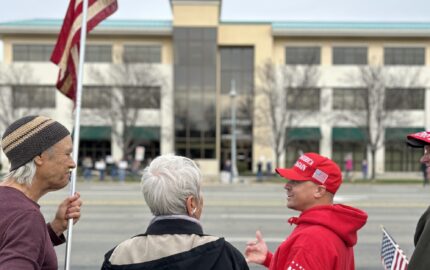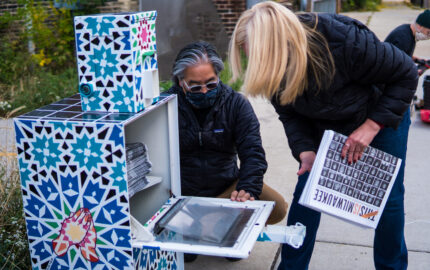
The Beat Goes On - Its Rhythm Changes
Beats form the backbone of a newsroom, so what happens when resources shrink, new voices emerge and platforms multiply? Which topics stick around? What new beats emerge? As Twitter cranks up the demand for constant interaction, how do beat reporters handle the daily grind? How do journalists connect with news consumers in a time of information overload? As e-book reading surges, is self-publishing the way to go? Dig in to these stories—and listen to Gabrielle Goodman perform our cover’s song that she wrote.
Florida politician Rod Smith once described Lucy Morgan of the St. Petersburg (Fla.) Times as the state’s “biggest pain in the ass.” But he added that his legislative colleagues in Tallahassee were grateful for her because otherwise “we would probably steal the silverware.” Smith was being facetious, of course; the silverware wouldn’t even begin to satisfy the kind of sticky-fingered politicians Morgan delights in exposing and the special interests with whom they’re usually in cahoots.
As the digital revolution devastates and reshapes the news media, I fear what’s likely to be lost in the shuffle is a next generation of statehouse beat reporters who will follow in the footsteps of people like the Pulitzer Prize-winning Morgan, the Chicago Tribune’s Ray Long, Steve Walters of the Milwaukee Journal Sentinel, and George Skelton of the Los Angeles Times. With their institutional knowledge, gigantic Rolodexes, and unending determination to afflict the comfortable and hold the powerful to account, these four outstanding journalists and others like them have been an awesome force for good government.
In the brave new world of information delivery—a world increasingly driven by rapid-fire tweeting and the inane cacophony of American television—there seems to be less and less room for people who want to make a career of covering the statehouse and earn a decent living doing it. There are now fewer than 500 professional journalists covering state government full time—and that includes those who work for The Associated Press, which still staffs this essential beat in every state. Press rooms once filled with reporters are now quiet relics of a bygone era.
A survey conducted by American Journalism Review (AJR) found that in 44 states there were fewer statehouse reporters in 2009 than there were six years earlier. The numbers in four states were unchanged from the 2003 AJR survey. In only two states—Rhode Island and Oregon—was there an increase.
It’s a damn shame because what happens at the state level affects our lives a whole lot more than what happens in Washington, D.C. Health care, education, business regulation—just name it and chances are that state regulations and policies have a lot more impact than what happens on the federal level. And the steadily dwindling number of statehouse beat reporters is likely to give rise to far more political flimflammery than the stealing of silverware in Florida.
Filling the Gap
Why do I think it’s important to have a flourishing statehouse press corps composed of beat reporters like the people I’ve mentioned?
Certainly, some will say, there are alternatives such as some of the online start-ups rising to fill the gap. And it’s true that there are dozens of news websites and hundreds of blogs devoted to covering state government, but there are few I’ve seen that can really do the job. Outfits like The Texas Tribune and The Connecticut Mirror are making an admirable effort. But I think even they would admit it will take some doing to become as known, respected and, yes, as feared as someone like Morgan. Her mere presence in Tallahassee encouraged the politicians to try to do better. Smith put his finger on it. Why succumb to a moral or ethical lapse if your family, friends and supporters are probably going to read all about it in the St. Petersburg Times sooner rather than later?
There’s an analogy between statehouse beat reporters—well, beat reporters in general—and cops on the beat who know the neighborhood and everyone in it. They get a sixth sense when something’s out of order, something’s not right, and by sniffing around they would find the story.
Today, many of the would-be replacements for statehouse beat reporters are interested first and foremost in investigative journalism. Investigative News Network (INN), a consortium of small to midsize online news organizations scattered throughout the country, is probably the outfit that I’m most familiar with. I’m glad it and other investigative sites such as ProPublica are out there, but I think about their role as I do about the FBI’s. Only the worst miscreants are likely to come under their scrutiny, and the chances of that happening even for the really bad guys are roughly equivalent to being struck by lightning.
“The beat reporter is the backbone of investigative journalism,” says Andy Hall of WisconsinWatch.org, a member of INN. “You look across history, and most of the big stories didn’t start off as projects. They started off with a beat reporter asking a few questions or checking a few records.”
There’s also another problem. Even the best of the online organizations have shoestring budgets and nowhere near the editorial, legal and business acumen of most traditional news operations, and by that I mean newspapers. Taking on powerful political interests is not a job for the weak or fainthearted, as many journalists can attest. It often requires an infrastructure that most of the start-ups lack.
Partisan Reporting
The decline of the statehouse beat is bad enough. What I find even worse is the influx of agenda-driven state “news” organizations, some with a leftist orientation but most of the newer entries tilted far to the right. They claim their sole reason for being is to inform the people and hold public officials accountable, filling a vacuum caused by the downsizing of the news industry. Their mission statements actually say they’re rushing to fill the gap.
Don’t believe it for a moment. Do what reporters should do: Check them out, as I have done. For the most part, the people in charge of these would-be watchdog operations are political hacks out to subvert journalism in their quest to grab and keep power using whatever means they have to do so. Good luck on finding out where they get their money; the IRS disclosure forms required of organizations that claim nonprofit status are singularly uninformative.
At the forefront of an effort to blur the distinction between statehouse reporting and political advocacy is the Franklin Center for Government & Public Integrity, which finances a network of websites that focus on state government. This center has ties to a number of conservative organizations, including the Americans for Prosperity Foundation, whose founder is billionaire David Koch. He is a longtime financier of right-wing causes whose shadowy political dealings were highlighted this past summer in a New Yorker article by Jane Mayer headlined “Covert Operations.”
Jason Stverak, a former executive director of the North Dakota Republican Party, heads the Franklin Center. He contends that it is wrong to infer from his partisan background and that of others who work with him that their reporting skews to the right. “I ran a [state] Republican Party. We disclose that fully on our website,” Stverak told me in a March 2010 interview that appears as part of “Ants at the Picnic: A Status Report on News Coverage of State Government,” a paper I wrote for Harvard’s Joan Shorenstein Center on the Press, Politics and Public Policy. “But at the end of the day it’s the same standar
d to which you would hold Fox News, CNN, The New York Times, New York Post, Fargo Forum, from my home state of North Dakota—you will judge any news organization based upon the content that they produce.”
However, four months later the Franklin Center cosponsored and played an active role in a two-day conference organized by the Americans for Prosperity Foundation. The Right Online Agenda conference included such breakout sessions as “Intro to Online Activism” and “Killing the Death Tax” and featured speakers such as conservative U.S. Representative Michele Bachmann of Minnesota and Tea Party activist Sharron Angle, a Republican who was then running against Harry Reid in the election for U.S. Senate in Nevada. No Democratic legislators were included in the program. The finale of the Las Vegas conference was a November is Coming Rally.
Yet Franklin Center websites are seeking legitimacy by demanding to be accredited in the various statehouses where they have sprung up. They also are applying for membership in Capitolbeat, a professional association of statehouse reporters and editors, according to Tiffany Shackelford, the association’s former executive director. The Illinois Legislative Correspondents Association denied membership to reporters working for the Franklin Center because the center declined to disclose information about its funding. However, a number of government offices have issued press credentials to those reporters.
“Don’t complain about the media; become the media” appears to be their philosophy. It would be the ultimate indignity if the empty chairs becoming more numerous in statehouse press rooms were to be filled by political tricksters.
Gene Gibbons writes about state and national politics. During his 41 years in journalism, he was employed by United Press International and Reuters, and subsequently was a founding editor of Stateline, a news website that focuses on state government and is funded by the Pew Charitable Trusts.
As the digital revolution devastates and reshapes the news media, I fear what’s likely to be lost in the shuffle is a next generation of statehouse beat reporters who will follow in the footsteps of people like the Pulitzer Prize-winning Morgan, the Chicago Tribune’s Ray Long, Steve Walters of the Milwaukee Journal Sentinel, and George Skelton of the Los Angeles Times. With their institutional knowledge, gigantic Rolodexes, and unending determination to afflict the comfortable and hold the powerful to account, these four outstanding journalists and others like them have been an awesome force for good government.
In the brave new world of information delivery—a world increasingly driven by rapid-fire tweeting and the inane cacophony of American television—there seems to be less and less room for people who want to make a career of covering the statehouse and earn a decent living doing it. There are now fewer than 500 professional journalists covering state government full time—and that includes those who work for The Associated Press, which still staffs this essential beat in every state. Press rooms once filled with reporters are now quiet relics of a bygone era.
A survey conducted by American Journalism Review (AJR) found that in 44 states there were fewer statehouse reporters in 2009 than there were six years earlier. The numbers in four states were unchanged from the 2003 AJR survey. In only two states—Rhode Island and Oregon—was there an increase.
It’s a damn shame because what happens at the state level affects our lives a whole lot more than what happens in Washington, D.C. Health care, education, business regulation—just name it and chances are that state regulations and policies have a lot more impact than what happens on the federal level. And the steadily dwindling number of statehouse beat reporters is likely to give rise to far more political flimflammery than the stealing of silverware in Florida.
Filling the Gap
Why do I think it’s important to have a flourishing statehouse press corps composed of beat reporters like the people I’ve mentioned?
Certainly, some will say, there are alternatives such as some of the online start-ups rising to fill the gap. And it’s true that there are dozens of news websites and hundreds of blogs devoted to covering state government, but there are few I’ve seen that can really do the job. Outfits like The Texas Tribune and The Connecticut Mirror are making an admirable effort. But I think even they would admit it will take some doing to become as known, respected and, yes, as feared as someone like Morgan. Her mere presence in Tallahassee encouraged the politicians to try to do better. Smith put his finger on it. Why succumb to a moral or ethical lapse if your family, friends and supporters are probably going to read all about it in the St. Petersburg Times sooner rather than later?
There’s an analogy between statehouse beat reporters—well, beat reporters in general—and cops on the beat who know the neighborhood and everyone in it. They get a sixth sense when something’s out of order, something’s not right, and by sniffing around they would find the story.
Today, many of the would-be replacements for statehouse beat reporters are interested first and foremost in investigative journalism. Investigative News Network (INN), a consortium of small to midsize online news organizations scattered throughout the country, is probably the outfit that I’m most familiar with. I’m glad it and other investigative sites such as ProPublica are out there, but I think about their role as I do about the FBI’s. Only the worst miscreants are likely to come under their scrutiny, and the chances of that happening even for the really bad guys are roughly equivalent to being struck by lightning.
“The beat reporter is the backbone of investigative journalism,” says Andy Hall of WisconsinWatch.org, a member of INN. “You look across history, and most of the big stories didn’t start off as projects. They started off with a beat reporter asking a few questions or checking a few records.”
There’s also another problem. Even the best of the online organizations have shoestring budgets and nowhere near the editorial, legal and business acumen of most traditional news operations, and by that I mean newspapers. Taking on powerful political interests is not a job for the weak or fainthearted, as many journalists can attest. It often requires an infrastructure that most of the start-ups lack.
Partisan Reporting
The decline of the statehouse beat is bad enough. What I find even worse is the influx of agenda-driven state “news” organizations, some with a leftist orientation but most of the newer entries tilted far to the right. They claim their sole reason for being is to inform the people and hold public officials accountable, filling a vacuum caused by the downsizing of the news industry. Their mission statements actually say they’re rushing to fill the gap.
Don’t believe it for a moment. Do what reporters should do: Check them out, as I have done. For the most part, the people in charge of these would-be watchdog operations are political hacks out to subvert journalism in their quest to grab and keep power using whatever means they have to do so. Good luck on finding out where they get their money; the IRS disclosure forms required of organizations that claim nonprofit status are singularly uninformative.
At the forefront of an effort to blur the distinction between statehouse reporting and political advocacy is the Franklin Center for Government & Public Integrity, which finances a network of websites that focus on state government. This center has ties to a number of conservative organizations, including the Americans for Prosperity Foundation, whose founder is billionaire David Koch. He is a longtime financier of right-wing causes whose shadowy political dealings were highlighted this past summer in a New Yorker article by Jane Mayer headlined “Covert Operations.”
Jason Stverak, a former executive director of the North Dakota Republican Party, heads the Franklin Center. He contends that it is wrong to infer from his partisan background and that of others who work with him that their reporting skews to the right. “I ran a [state] Republican Party. We disclose that fully on our website,” Stverak told me in a March 2010 interview that appears as part of “Ants at the Picnic: A Status Report on News Coverage of State Government,” a paper I wrote for Harvard’s Joan Shorenstein Center on the Press, Politics and Public Policy. “But at the end of the day it’s the same standar
d to which you would hold Fox News, CNN, The New York Times, New York Post, Fargo Forum, from my home state of North Dakota—you will judge any news organization based upon the content that they produce.”
However, four months later the Franklin Center cosponsored and played an active role in a two-day conference organized by the Americans for Prosperity Foundation. The Right Online Agenda conference included such breakout sessions as “Intro to Online Activism” and “Killing the Death Tax” and featured speakers such as conservative U.S. Representative Michele Bachmann of Minnesota and Tea Party activist Sharron Angle, a Republican who was then running against Harry Reid in the election for U.S. Senate in Nevada. No Democratic legislators were included in the program. The finale of the Las Vegas conference was a November is Coming Rally.
Yet Franklin Center websites are seeking legitimacy by demanding to be accredited in the various statehouses where they have sprung up. They also are applying for membership in Capitolbeat, a professional association of statehouse reporters and editors, according to Tiffany Shackelford, the association’s former executive director. The Illinois Legislative Correspondents Association denied membership to reporters working for the Franklin Center because the center declined to disclose information about its funding. However, a number of government offices have issued press credentials to those reporters.
“Don’t complain about the media; become the media” appears to be their philosophy. It would be the ultimate indignity if the empty chairs becoming more numerous in statehouse press rooms were to be filled by political tricksters.
Gene Gibbons writes about state and national politics. During his 41 years in journalism, he was employed by United Press International and Reuters, and subsequently was a founding editor of Stateline, a news website that focuses on state government and is funded by the Pew Charitable Trusts.


